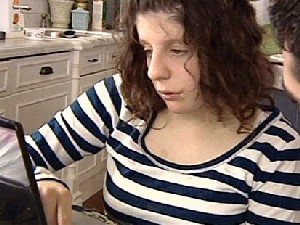 People with autism generally fight an uphill battle, both against their disorder and the perceptions of others around them. The condition autistic folks struggle with on a daily basis is known primarily as a hindrance to communication and social interaction, so many of the things we take for granted, such as asking for a particular food for lunch or expressing a desire smack Ryan Seacrest, are difficult (if not impossible) for the autistic person to communicate. That’s why breakthroughs such as Carly Fleischman’s, who cannot speak but does use a computer to communicate, are so important.
People with autism generally fight an uphill battle, both against their disorder and the perceptions of others around them. The condition autistic folks struggle with on a daily basis is known primarily as a hindrance to communication and social interaction, so many of the things we take for granted, such as asking for a particular food for lunch or expressing a desire smack Ryan Seacrest, are difficult (if not impossible) for the autistic person to communicate. That’s why breakthroughs such as Carly Fleischman’s, who cannot speak but does use a computer to communicate, are so important.
Autism is one of the most mysterious and least understood brain development disorders cognitive psychologists and neuroscientists. Because by nature autism is a communication disorder first and foremost, the true intelligence level of an autistic person is basically unknown as most screeners depend on language, either verbal or written. Thanks to her newfound expression ability, Carly is able to give researchers a peek inside the mind of an autistic person in a way that is normally impossible. From providing a reason for the self-injurious behavior that’s one of the characteristics of autism to a window into how the autistic person interacts with siblings and peers, Carly’s words are stunning due to the sensitive and articulate portrait she paints of herself:
“Autism is hard because you want to act one way, but you can’t always do that. It’s sad that sometimes people don’t know that sometimes I can’t stop myself and they get mad at me. If I could tell people one thing about autism it would be that I don’t want to be this way. But I am, so don’t be mad. Be understanding.”
This is a girl who would have likely been abandoned to the silent prison of her disorder had it not been for the tireless efforts of her parents and speech-language pathologists. Kudos to them for not giving up, and kudos to Carly for offering the world such an honest look at the daily struggles faced by the fast-growing autistic community.
Tags: autism, autism spectrum disorder, asperger’s disorder, cognitive psychology







